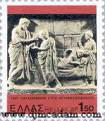
AMPHIARAUS, in Greek mythology, a celebrated seer and prince of Argos, son of Oicles (or Apollo) and Hypermestra, and through his father descended from the prophet Melampus (Odyssey, xv. 244). He took part in the voyage of the Argonauts and in the chase of the Calydonian boar; but his chief fame is in connection with the expedition of the Seven against Thebes, organized by Adrastus, the brother of his wife Eriphyle, for the purpose of restoring Polyneices to the throne. Amphiaraus, foreseeing the disastrous issue of the war, at first refused to share in it; he had, however, promised Eriphyle when he married her that, in the event of any dispute arising between her brother and himself, she should decide between them; and now Eriphyle, bribed by Polyneices with the fatal necklace given by Cadmus to Harmonia, persuaded him against his better judgment to set out on the expedition. Knowing his doom, he bade his sons, Alcmaeon and Amphilochus, avenge his death upon their mother, upon whom, as he stepped into his chariot, he turned a look of anger. This scene was represented upon the chest of Cypselus described by Pausanias (v. 17).
The assault on Thebes was disastrous for the Seven; and Amphiaraus, pursued by Periclymenus, would have been slain with his spear, had not Zeus with a thunderbolt opened a chasm into which the seer, with his chariot, horses and charioteer, disappeared. Henceforth he was numbered with the immortals and worshipped as a god. Near Oropus, on the supposed site of his passing, his sanctuary arose, with healing springs, and an oracle famous for its interpretation of dreams (Pausanias i. 34). The ruins of this temple, with inscriptions which identify it, have been discovered and preserved at Mavrodilisi, in the provinces of Boeotia and Attica. There was another temple dedicated to him on the road from Thebes to Potniae, and here was the oracle of Amphiaraus consulted by Croesus and Mardonius.
Homer, Odyssey, xi. 326; Herodotus viii. 134; Pindar, Olympia, vi., Nemea, ix.; Apollodorus iii. 6.
Disclosure: We are independently owned and the opinions expressed here are our own. We do have advertisements with links to other sites on our pages, and may receive compensation when you click on one of those links and/or purchase something from one of those sites.
Copyright © D. J. McAdam· All Rights Reserved